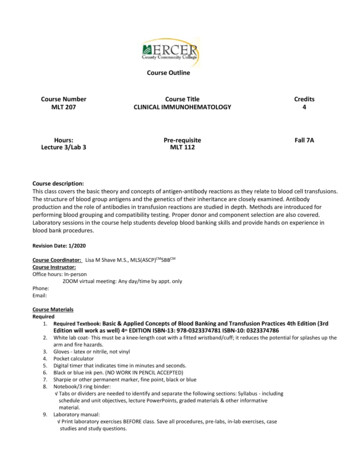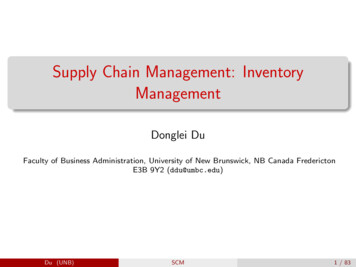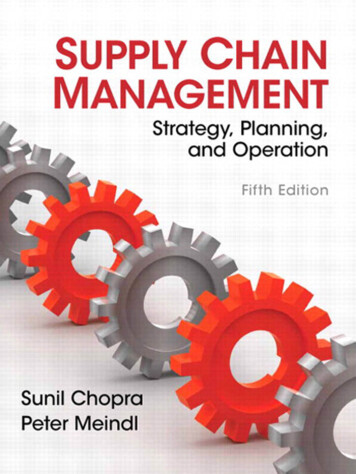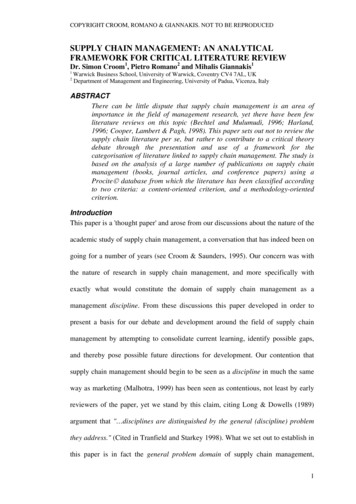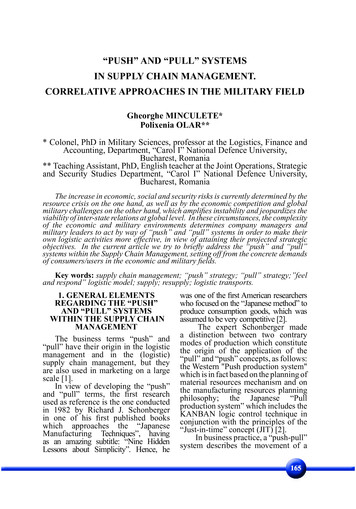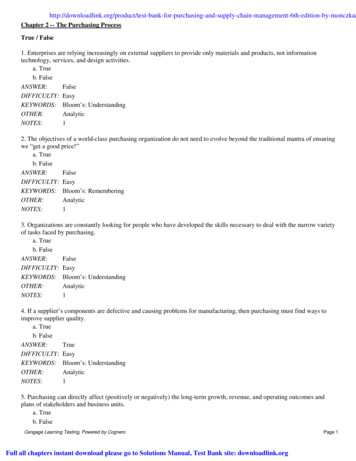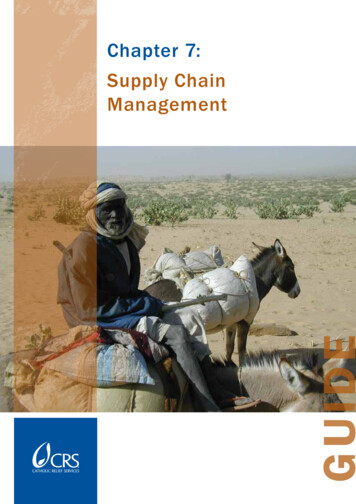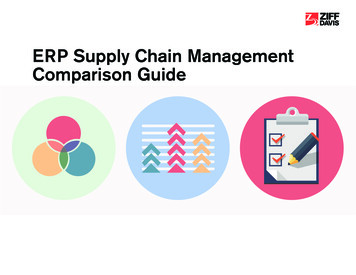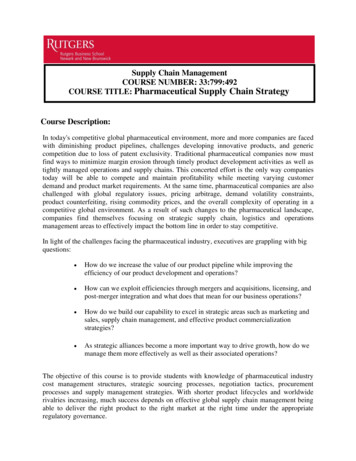
Transcription
Supply Chain ManagementCOURSE NUMBER: 33:799:492COURSE TITLE: Pharmaceutical Supply Chain StrategyCourse Description:In today's competitive global pharmaceutical environment, more and more companies are facedwith diminishing product pipelines, challenges developing innovative products, and genericcompetition due to loss of patent exclusivity. Traditional pharmaceutical companies now mustfind ways to minimize margin erosion through timely product development activities as well astightly managed operations and supply chains. This concerted effort is the only way companiestoday will be able to compete and maintain profitability while meeting varying customerdemand and product market requirements. At the same time, pharmaceutical companies are alsochallenged with global regulatory issues, pricing arbitrage, demand volatility constraints,product counterfeiting, rising commodity prices, and the overall complexity of operating in acompetitive global environment. As a result of such changes to the pharmaceutical landscape,companies find themselves focusing on strategic supply chain, logistics and operationsmanagement areas to effectively impact the bottom line in order to stay competitive.In light of the challenges facing the pharmaceutical industry, executives are grappling with bigquestions: How do we increase the value of our product pipeline while improving theefficiency of our product development and operations? How can we exploit efficiencies through mergers and acquisitions, licensing, andpost-merger integration and what does that mean for our business operations? How do we build our capability to excel in strategic areas such as marketing andsales, supply chain management, and effective product commercializationstrategies? As strategic alliances become a more important way to drive growth, how do wemanage them more effectively as well as their associated operations?The objective of this course is to provide students with knowledge of pharmaceutical industrycost management structures, strategic sourcing processes, negotiation tactics, procurementprocesses and supply management strategies. With shorter product lifecycles and worldwiderivalries increasing, much success depends on effective global supply chain management beingable to deliver the right product to the right market at the right time under the appropriateregulatory governance.
About the Instructor:Bruce E. Sullivan is Vice President, Aspen Pharmaceuticals USA in Bridgewater, NJ. He hasresponsibilities for Commercial, Supply Chain, Finance, Quality and Regulatory departmentsfor all marketed products. In addition, he also has responsibility for all new commercial productlaunches which involve 3-party Marketing, Sales & Distribution partners in the women’s healthand oncology categories.Mr. Sullivan holds a Bachelors of Science from Worcester Polytechnic Institute, a Masters ofBusiness Administration from Rensslaer Polytechnic Institute, as well as, an AdvancedManagement Certification in International Business from Babson College. He is trained inExecutive Leadership and Strategy Development at Cranfield University (UK) and is certifiedas a Project Management Professional (PMP).Mr. Sullivan is a Part-Time Lecturer for both the Newark Rutgers Business School (MBA level)and Rutgers University (Undergraduate level) where he teaches a range of Supply Chainmanagement courses. In addition, he has taught internal corporate training curriculum in theareas of Statistical Process Control (SPC), Project Management (PM) and Kaizenmanufacturing philosophy.Performance Assessment:1. Class Participation – 15%2. Group Case Study Assignment I – 15%3. Group Case Study Assignment II – 15%4. Final Exam – 25%5. Group Case Project – 30%Course Procedures:1. Course lecture notes will be posted on blackboard prior to each class. Students areexpected to review the lecture notes prior to each class.2. All assigned reading must be conducted prior to class and each student must beprepared to discuss the cases during class discussions.3. The class meets every Thursday at 6:40pm. Punctuality is important.4. Respect for one another is mandatory during class discussion.
5. All cell phones must be silenced at the start of class to minimize disruptions. If you needto take a call, please exit the class room quietly so that the discussions are not disrupted.6. If you will miss any class, make arrangements with the instructor for any material thatmay be missed. Missing more than one class will not be acceptable and will have asignificant impact on your grade.7. Participation is strongly encouraged and is a part of your grade. Everyone is expected toparticipate fully in class discussions.Honesty and Integrity:Any form of dishonesty will result in an “F” grade for the course. All of your written work mustbe your own. All references must be cited. Plagiarism will not be tolerated.Class Agenda:Questions / Review of Previous ClassLecture6:40pm – 7:00pm7:00pm – 8:45pmReview/Analysis of Selected Cases 8:45pm – 9:30pmSemester Breakdown:Week 1 – January 23, 20201. Lecture – Strategic Supply Chain Review2. Case Reading – Strengthening the Health Care’s Supply ChainWeek 2 – January 30, 20201. Lecture I – Fundamentals of Pharmaceutical Operations2. Case Reading – KPMG: The Life Science Supply Chain3. https://www.youtube.com/watch?v oQSGX93J50IWeek 3 – February 6, 20201. Lecture II – Fundamentals of Pharmaceutical Operations2. Case Reading – Outlook on Pharma Operations3. https://www.youtube.com/watch?v teb1Cm-7cioWeek 4 – February13, 20201. Lecture I – Pharmaceutical Supply Chain: Discovery through Commercialization ofBranded, Generic, OTC, Cosmeceuticals, and Nutraceuticals Product Operations2. Case Reading – Clinical Trial Supply Chain Management3. https://www.youtube.com/watch?v 3Gl0gAcW8rw
Week 5 – February 20, 20201. Group Case ResearchWeek 6 – February 27, 20201. Lecture II – Pharmaceutical Supply Chain: Discovery through Commercializationof Branded, Generic, OTC, Cosmeceuticals, and Nutraceuticals ProductOperations2. Case Reading – The Pharmaceutical Supply Chain3. https://www.youtube.com/watch?v QIomXDi8 5UWeek 7 – March 5, 20201. Lecture III – Pharmaceutical Supply Chain: Discovery through Commercializationof Branded, Generic, OTC, Cosmeceuticals, and Nutraceuticals ProductOperations2. Case Reading – The New Rx for Pharma Manufacturing Supply Chain3. https://www.youtube.com/watch?v q4d19FqDTmU4. Group Case Research Project I Due – HBR: Shanghai PharmaceuticalsWeek 8 – March12, 20201. Lecture I – Pharmaceutical Sales & Operations Planning – Matching Supply and Demand2. https://www.youtube.com/watch?v h9 I0IfAAI4Week 9 – March 19,2020 SpringBreak – NO CLASSWeek 10 – March 26, 20201. Lecture II – Pharmaceutical Sales & Operations Planning – Matching Supply and Demand2. HBR Case Study – Forecasting DenosumbWeek 11 – April 2, 20201. Lecture I – Inventory Control Systems, Logistics Management, and Distribution Networks2. Case Reading – Securing the Global Pharmaceutical Supply Chain3. https://www.youtube.com/watch?v rSpIkuvTLh04. Group Case Research Project II Due – HBR: McKessonWeek 12 – April 9, 20201. Group Case ResearchWeek 13 – April 16, 20201. Lecture II – Inventory Control Systems, Logistics Management, and Distribution Networks
2. Case Reading – Preparing the Supply Chain Pharma Needs3. https://www.youtube.com/watch?v M9FAHeSPMos4. In Class Final ExamWeek 14 – April 23, 20201. Group Case Research Presentations2. Innovation in Pharmaceutical Supply ChainWeek 15 – April 30, 20201. Group Case Research Presentations2. Innovation in Pharmaceutical Supply ChainHarvard Business Review Course 8Group Case Assignments:Group case assignments consist of teams of four. Each case is to be read and analyzed by thegroup and a 5 to 7 page term paper is to be submitted by the group. The term paper will give asynopsis of the case as well as answers to the questions embedded in the case. One grade willbe issued for all team members. A hard copy of the case should be provided to the instructor aswell as an electronically copy due date outlined in the weekly schedule above.Group Case Project:The Pharmaceutical Supply Chain Strategy Term Project consists of a team term paper andpresentation. Each team will research and develop an innovation which aims to solve a criticalpharmaceutical life science issue. The innovation can be a new product, service or process.The innovation that your team chooses for preparing the business model need not berestricted to product innovation, but could also be a process innovation which can includesystems, company mergers, etc. Each team must present a one page summary of the proposedidea by March 8th. You should also include in your report an executive summary whichencapsulates the gist of your analysis.Note: You should not cut-and-paste verbatim material from any sources, unless you use thatmaterial as exact quotes. In that case be sure to enclose any pasted text material in doublequotes and to provide an exact reference for it. All pasted graphs and charts should also beproperly referenced.Suggested Outline for Pharmaceutical Supply Chain Management Term Project
1. Term paper should be no more than 20 pages not including supportingdocumentation (graphs, charts, etc.)Term Paper Specifications:a. Double spaced/Size 12 Times New Roman fontb. Margins should be no more than 0.75 aroundc. Properly notate all referencesd. A hard bound copy as well as an electronic copy is to be provided to the instructoron the due date prior to the scheduled class meeting time2.The structure of the term paper should include the following:a. Executive summaryb. Current state of the topicc. Analysis, key issues, product presentation and design, etc.d. Financial considerationse. Future trends, opinions and conclusions
Mr. Sullivan is a Part-Time Lecturer for both the Newark Rutgers Business School (MBA level) and Rutgers University (Undergraduate level) where he teaches a range of Supply Chain management courses. In addition, he has taught internal corporate training curriculum in the . Case Reading – Outlook on

